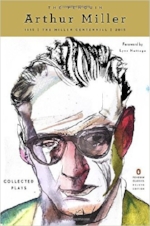All My Sons (1947)
by Arthur Miller.
The Keller family harbors a secret, a secret that seems to be in plain sight of the neighbors and even the nation. Joe Keller is a manufacturer, who made and sold defective airplane engines during the war that led to 21 pilot deaths. He was exonerated before the play starts, and the blame was taken by his partner, former neighbor and family friend, Steve Deever. Now, their one surviving son, Chris, wishes to marry Ann Deever, daughter to Steve and former sweetheart of Larry, the Kellers’ son who was a pilot that vanished during the war. The rumor of Chris and Ann’s marital union is enough to stir the Furies of Miller’s moral universe, and all the secrets will come out.
“All My Sons” is a masterpiece. Miller entered the mainstream as a fully-fledged Ibsen at age 31/32. With his follow-up play, “Death of a Salesman” (1949), he broke new formal ground, like some real life Eilert Lovborg (see “Hedda Gabler”) with one work encompassing the past and the other projecting into the future. Come to think of it, Tennessee Williams did a similar thing with his two masterpieces, "The Glass Menagerie" (1944) and "Streetcar Named Desire" (1947)—although in Williams’ case, the earlier play was the greater formal invention. Both playwrights hit their peaks right as they broke out and then spent years more or less trying to match them.
With this work, Miller certainly leaned heavily into the well-made play form, and I believe it is the first great American play to do so so holistically. The work of O'Neill is not so well-crafted, and Tennessee Williams was not so plot-focused. “All My Sons” follows a tragic arc, setting an ensemble in motion and not just one flawed protagonist. Chris, Joe, Kate and Ann are at the center, but then you have this rich fabric of character and setting around them. The clarity of character desire and relationship history is reminiscent of Ibsen and even Chekhov. The play is strictly Realist with some poetic leanings (qua Ibsen) in its language and its use of symbol and irony. It lacks the Expressionism of "Salesman," but takes the socially-minded Realist genre to its highest point perhaps since "A Doll House" 68 years earlier. It’s interesting that "The Crucible" is unable to ascend to the height of craft and soul Miller reveals here. Perhaps because it is abstracted somewhat, removed (ironically enough) by time and factuality from authentic human feeling. That play gets its power not so much from characterization but from its true and disturbing subject matter.
I take back any blanket statements I’ve made about Miller not being able to write a complex female character. I’d forgotten how wonderful the mother, Kate, is in this play. I remember Ellen McLaughlin playing her at Playmakers Rep in 2010 and doing such a marvelous, show-stopping job. Ann is a good role, as well, but Kate is the emotional storm at the play’s center— somewhere between Antigone and Medea, with a bit of Lady MacBeth thrown in there.
"Be smart now, Joe. The boy is coming. Be smart."
The play is marvelous: the specificity of character and relationship; the idiosyncrasy, nuance and power of the dialogue; the dynamic blending of the cooing siren of the delusional familiar and the blaring siren of the furies of the principled heart. Truth is terrible. Arthur Miller was our Sophocles. “All My Sons” was his “Antigone”, and “Salesman” was his "Oedipus Rex." Does anyone have more than two masterpieces, besides Shakespeare and maybe Chekhov?.
DRAMA CIRCLE RECOMMENDATION:





